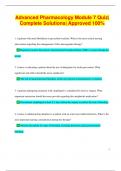Exam (elaborations)
Advanced Pharmacology Module 7 Quiz| Complete Solutions| Approved 100%
- Course
- Institution
Advanced Pharmacology Module 7 Quiz| Complete Solutions| Approved 100% 1. A patient with atrial fibrillation is prescribed warfarin. What is the most critical nursing intervention regarding the management of this anticoagulant therapy? Regularly monitor the patient's International Normalize...
[Show more]



